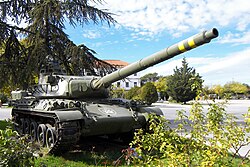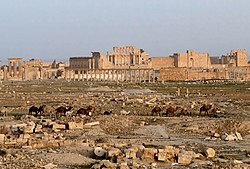Portal:History
The History Portal

History by Frederick Dielman
History is the systematic study of the past, focusing primarily on the human past. As an academic discipline, it analyses and interprets evidence to construct narratives about what happened and explain why it happened. Some theorists categorize history as a social science, while others see it as part of the humanities or consider it a hybrid discipline. Similar debates surround the purpose of history—for example, whether its main aim is theoretical, to uncover the truth, or practical, to learn lessons from the past. In a more general sense, the term history refers not to an academic field but to the past itself, times in the past, or to individual texts about the past.
Historical research relies on primary and secondary sources to reconstruct past events and validate interpretations. Source criticism is used to evaluate these sources, assessing their authenticity, content, and reliability. Historians strive to integrate the perspectives of several sources to develop a coherent narrative. Different schools of thought, such as positivism, the Annales school, Marxism, and postmodernism, have distinct methodological approaches.
History is a broad discipline encompassing many branches. Some focus on specific time periods, such as ancient history, while others concentrate on particular geographic regions, such as the history of Africa. Thematic categorizations include political history, military history, social history, and economic history. Branches associated with specific research methods and sources include quantitative history, comparative history, and oral history.
History emerged as a field of inquiry in antiquity to replace myth-infused narratives, with influential early traditions originating in Greece, China, and later in the Islamic world. Historical writing evolved throughout the ages and became increasingly professional, particularly during the 19th century, when a rigorous methodology and various academic institutions were established. History is related to many fields, including historiography, philosophy, education, and politics. (Full article...)
Featured picture
Did you know (auto generated)

- ... that the developers of The Pale Beyond were inspired by stories from historical Antarctic and Arctic expeditions?
- ... that United States president Joe Biden began his political career by unseating an incumbent county councilman?
- ... that fifteen future Pro Football Hall of Fame players have been drafted by the Detroit Lions?
- ... that Elisabeth Griffith's sweeping 100-year history of the American equal-rights movement has been compared to listening to Billy Joel's "We Didn't Start the Fire"?
- ... that a 2001 book shares the history of a small Tudor community through a 54-year-long "running commentary" by "a somewhat unamiable busybody"?
- ... that the Labour Party received their highest share of the vote to date in the 1951 UK general election but still lost to the Conservatives, who received fewer votes?
William Samuel Sadler (June 24, 1875 – April 26, 1969) was an American surgeon, self-trained psychiatrist, and author who helped publish The Urantia Book. The book is said to have resulted from Sadler's relationship with a man through whom he believed celestial beings spoke at night. It drew a following of people who studied its teachings.
A native of Indiana, Sadler moved to Michigan as a teenager to work at the Battle Creek Sanitarium. There he met the physician and health-food promoter John Harvey Kellogg, co-inventor of corn flakes breakfast cereal, who became his mentor. Sadler married Kellogg's niece, Lena Celestia Kellogg, in 1897. He worked for several Christian organizations and attended medical school, graduating in 1906. Sadler practiced medicine in Chicago with his wife, who was also a physician. He joined several medical associations and taught at the McCormick Theological Seminary. Although he was a committed member of the Seventh-day Adventist Church for almost twenty years, he left the denomination after it disfellowshipped his wife's uncle, John Harvey Kellogg, in 1907. Sadler and his wife became speakers on the Chautauqua adult education circuit in 1907, and he became a highly paid, popular orator. He eventually wrote over 40 books on a variety of medical and spiritual topics advocating a holistic approach to health. Sadler extolled the value of prayer and religion but was skeptical of mediums, assisting debunker Howard Thurston, and embraced the scientific consensus on evolution. (Full article...)
On this day
May 5: Lixia begins in China (2025); Children's Day in Japan; Cinco de Mayo in Mexico and the United States
- 1646 – First English Civil War: Charles I surrendered himself to Scottish Covenanter leader David Leslie near Newark, England.
- 1864 – American Civil War: Union Lt. Gen. Ulysses S. Grant's Overland Campaign in Virginia began with the inconclusive Battle of the Wilderness in Spotsylvania County.
- 1891 – Carnegie Hall (interior pictured) in New York City, built by the philanthropist Andrew Carnegie, officially opened with a concert conducted by Pyotr Ilyich Tchaikovsky.
- 1980 – The British Special Air Service recaptured the Iranian embassy in London following a six-day siege after Iranian Arab separatists had seized it.
- Samuel Cooper (d. 1672)
- William George Beers (b. 1841)
- Irene Gut Opdyke (b. 1918)
Selected quote
As long as I breathe I hope. As long as I breathe I shall fight for the future, that radiant future, in which man, strong and beautiful, will become master of the drifting stream of his history and will direct it towards the boundless horizons of beauty, joy and happiness!
— Leon Trotsky, 20th century Russian revolutionary
Related portals
More Did you know...
- ... that, when Ghenadie Petrescu (pictured) was ousted from his post of Metropolitan-Primate, Romania experienced protests and riots?
- ... that the British destroyer HMS Highlander escorted Convoy SC 122 through the largest convoy battle of World War II in March 1943 and was unsuccessfully attacked by U-441 and U-608?
- ... that in 1911, John Gaunt's second biplane nearly crashed because a bystander bent the aircraft's elevator before a flight?
- ... that Themistokli Gërmenji, an Albanian nationalist, received the French Croix de Guerre in November 1917, but was executed shortly thereafter by a French military court?
- ... that fish-knives inscribed with Elokeshi's name were sold after her husband decapitated her with a fish-knife following her adulterous affair with a Hindu head-priest?
- ... that the ancient Roman dancer Galeria Copiola reached the age of 104?
- ... that to escape burning at the 1393 Bal des Ardents Charles VI of France huddled under the gown of the Duchesse de Berry, while a lord leaped into a wine vat?
- ... that a junior officer on the USS Ancon refused King George VI entry to the ship's intelligence centre because no one told him the King "was a Bigot"?
Topics
Categories

History • By period • By region • By topic • By ethnic group • Historiography • Archaeology • Books • Maps • Images • Magazines • Organizations • Fictional • Museums • Pseudohistory • Stubs • Timelines • Chronology • People • Wikipedia historians
WikiProjects
![]() WikiProject History •
Ancient Near East • Australian History • Classical Greece and Rome • Dacia • Former countries • History of Canada • Chinese history • European history • Heraldry and vexillology • Indian history • Jewish history • Medieval Scotland • Mesoamerica • Military history • Middle Ages • History of Science
WikiProject History •
Ancient Near East • Australian History • Classical Greece and Rome • Dacia • Former countries • History of Canada • Chinese history • European history • Heraldry and vexillology • Indian history • Jewish history • Medieval Scotland • Mesoamerica • Military history • Middle Ages • History of Science
WikiProject Time • Days of the Year • Years
WikiProject Biography • Composers • Political figures • Saints • United States Presidents
Things you can do
 |
Here are some tasks awaiting attention:
|
Associated Wikimedia
The following Wikimedia Foundation sister projects provide more on this subject:
-
Commons
Free media repository -
Wikibooks
Free textbooks and manuals -
Wikidata
Free knowledge base -
Wikinews
Free-content news -
Wikiquote
Collection of quotations -
Wikisource
Free-content library -
Wikiversity
Free learning tools -
Wiktionary
Dictionary and thesaurus





















































